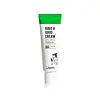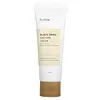What's inside
What's inside
 Key Ingredients
Key Ingredients

 Benefits
Benefits

 Concerns
Concerns

 Ingredients Side-by-side
Ingredients Side-by-side

Water
Skin ConditioningCetyl Ethylhexanoate
EmollientButylene Glycol
HumectantGlycerin
HumectantSqualane
EmollientCentella Asiatica Extract 1.05%
CleansingBacillus Ferment
Skin Conditioning1,2-Hexanediol
Skin ConditioningDicaprylyl Carbonate
EmollientCetearyl Alcohol
EmollientCetearyl Olivate
Trehalose
HumectantArachidyl Alcohol
EmollientDimethicone
EmollientSorbitan Olivate
EmulsifyingArginine
MaskingCarbomer
Emulsion StabilisingPanthenol
Skin ConditioningCaprylyl Glycol
EmollientBehenyl Alcohol
EmollientHydrogenated Lecithin
EmulsifyingArachidyl Glucoside
EmulsifyingSimmondsia Chinensis Seed Oil
EmollientMacadamia Ternifolia Seed Oil
EmollientEthylhexylglycerin
Skin ConditioningAllantoin
Skin ConditioningDimethicone/Vinyl Dimethicone Crosspolymer
Skin ConditioningSodium Hyaluronate
HumectantMentha Haplocalix Extract
MaskingSnail Secretion Filtrate 0.025%
Skin ConditioningMenthyl Lactate
MaskingDisodium EDTA
Backhousia Citriodora Leaf Oil
MaskingPhenoxyethanol
PreservativeAsiaticoside
AntioxidantMadecassic Acid
Skin ConditioningAsiatic Acid
Skin ConditioningBeta-Glucan
Skin ConditioningCitral
PerfumingWater, Cetyl Ethylhexanoate, Butylene Glycol, Glycerin, Squalane, Centella Asiatica Extract 1.05%, Bacillus Ferment, 1,2-Hexanediol, Dicaprylyl Carbonate, Cetearyl Alcohol, Cetearyl Olivate, Trehalose, Arachidyl Alcohol, Dimethicone, Sorbitan Olivate, Arginine, Carbomer, Panthenol, Caprylyl Glycol, Behenyl Alcohol, Hydrogenated Lecithin, Arachidyl Glucoside, Simmondsia Chinensis Seed Oil, Macadamia Ternifolia Seed Oil, Ethylhexylglycerin, Allantoin, Dimethicone/Vinyl Dimethicone Crosspolymer, Sodium Hyaluronate, Mentha Haplocalix Extract, Snail Secretion Filtrate 0.025%, Menthyl Lactate, Disodium EDTA, Backhousia Citriodora Leaf Oil, Phenoxyethanol, Asiaticoside, Madecassic Acid, Asiatic Acid, Beta-Glucan, Citral
Water
Skin ConditioningCentella Asiatica Leaf Water
Skin ConditioningButylene Glycol
HumectantButyrospermum Parkii Butter
Skin ConditioningCetearyl Alcohol
EmollientGlycereth-26
Humectant1,2-Hexanediol
Skin ConditioningCetearyl Olivate
Simmondsia Chinensis Seed Oil
EmollientCamellia Japonica Seed Oil
EmollientSorbitan Olivate
EmulsifyingBeeswax
Emulsion StabilisingSorbitan Sesquioleate
EmulsifyingVinyldimethicone
Glyceryl Stearate
EmollientArginine
MaskingAcrylates/C10-30 Alkyl Acrylate Crosspolymer
Emulsion StabilisingSnail Extract
EmollientXanthan Gum
EmulsifyingSodium Polyacrylate
AbsorbentAdenosine
Skin ConditioningDisodium EDTA
Ethylhexylglycerin
Skin ConditioningCentella Asiatica Extract
CleansingScutellaria Baicalensis Root Extract
AstringentPolygonum Cuspidatum Root Extract
AntioxidantDipotassium Glycyrrhizate
HumectantCamellia Sinensis Leaf Extract
AntimicrobialPentylene Glycol
Skin ConditioningCaprylyl Glycol
EmollientCynanchum Atratum Extract
Skin ConditioningChamomilla Recutita Flower Extract
MaskingRosmarinus Officinalis Leaf Extract
AntimicrobialWater, Centella Asiatica Leaf Water, Butylene Glycol, Butyrospermum Parkii Butter, Cetearyl Alcohol, Glycereth-26, 1,2-Hexanediol, Cetearyl Olivate, Simmondsia Chinensis Seed Oil, Camellia Japonica Seed Oil, Sorbitan Olivate, Beeswax, Sorbitan Sesquioleate, Vinyldimethicone, Glyceryl Stearate, Arginine, Acrylates/C10-30 Alkyl Acrylate Crosspolymer, Snail Extract, Xanthan Gum, Sodium Polyacrylate, Adenosine, Disodium EDTA, Ethylhexylglycerin, Centella Asiatica Extract, Scutellaria Baicalensis Root Extract, Polygonum Cuspidatum Root Extract, Dipotassium Glycyrrhizate, Camellia Sinensis Leaf Extract, Pentylene Glycol, Caprylyl Glycol, Cynanchum Atratum Extract, Chamomilla Recutita Flower Extract, Rosmarinus Officinalis Leaf Extract
 Reviews
Reviews

Ingredients Explained
These ingredients are found in both products.
Ingredients higher up in an ingredient list are typically present in a larger amount.
1,2-Hexanediol is a synthetic liquid and another multi-functional powerhouse.
It is a:
- Humectant, drawing moisture into the skin
- Emollient, helping to soften skin
- Solvent, dispersing and stabilizing formulas
- Preservative booster, enhancing the antimicrobial activity of other preservatives
Arginine is an amino acid that is important for human development. Your body uses is it to produce hair keratin and skin collagen.
As a cosmetic ingredient, Arginine has antioxidant properties and can also help repair damaged skin. This ingredient is derived either synthetically or from animals.
Arginine isn't fungal acne safe when used in the presence of other lipids (fats, fatty acids, oils, esters, etc). Oils and fats occur naturally within the skin, so take caution when using Arginine if you're prone to fungal acne.
Learn more about ArginineButylene Glycol (or BG) is used within cosmetic products for a few different reasons:
Overall, Butylene Glycol is a safe and well-rounded ingredient that works well with other ingredients.
Though this ingredient works well with most skin types, some people with sensitive skin may experience a reaction such as allergic rashes, closed comedones, or itchiness.
Learn more about Butylene GlycolCaprylyl Glycol is a humectant and emollient, meaning it attracts and preserves moisture.
It is a common ingredient in many products, especially those designed to hydrate skin. The primary benefits are retaining moisture, skin softening, and promoting a healthy skin barrier.
Though Caprylyl Glycol is an alcohol derived from fatty acids, it is not the kind that can dry out skin.
This ingredient is also used as a preservative to extend the life of products. It has slight antimicrobial properties.
Learn more about Caprylyl GlycolCentella Asiatica Extract (Centella) is derived from an herb native to Southeast Asia. It is famous for its anti-inflammatory and soothing properties.
Centella is rich in antioxidants and amino acids, such as Madecassic Acid and Asiaticoside.
Studies show the compounds in centella help with:
The combination of all these properties makes centella effective at soothing, hydrating, and protecting the skin.
Other great components of centella include Vitamin A, vitamin C, several B vitamins, and Asiatic Acid.
Fun fact: Centella has been used as a medicine and in food for many centuries. As a medicine, it is used to treat burns, scratches, and wounds.
Learn more about Centella Asiatica ExtractCetearyl alcohol is a mixture of two fatty alcohols: cetyl alcohol and stearyl alcohol. It is mainly used as an emulsifier. Emulsifiers help prevent the separation of oils and products. Due to its composition, it can also be used to thicken a product or help create foam.
Cetearyl alcohol is an emollient. Emollients help soothe and hydrate the skin by trapping moisture.
Studies show Cetearyl alcohol is non-toxic and non-irritating. The FDA allows products labeled "alcohol-free" to have fatty alcohols.
This ingredient is usually derived from plant oils such as palm, vegetable, or coconut oils. There is debate on whether this ingredient will cause acne.
Due to the fatty acid base, this ingredient may not be Malassezia folliculitis safe.
Learn more about Cetearyl AlcoholCetearyl Olivate is an emulsifier and texture enhancer. It is derived from the fatty acids of olive oil and Cetearyl alcohol, and is biodegradable.
As an emulsifier, it is used to prevent oils and waters from separating. It can also
Manufacturers use the name Olivem 1000. This ingredient has been found to preserve the natural microbiome of skin. Having a healthy microbiome helps keep our skin healthy and protects against harmful bacteria. This ingredient is grouped with Sorbitan Olivate under the name Olivem 1000.
Learn more about Cetearyl OlivateDisodium EDTA plays a role in making products more stable by aiding other preservatives.
It is a chelating agent, meaning it neutralizes metal ions that may be found in a product.
Disodium EDTA is a salt of edetic acid and is found to be safe in cosmetic ingredients.
Learn more about Disodium EDTAEthylhexylglycerin (we can't pronounce this either) is commonly used as a preservative and skin softener. It is derived from glyceryl.
You might see Ethylhexylglycerin often paired with other preservatives such as phenoxyethanol. Ethylhexylglycerin has been found to increase the effectiveness of these other preservatives.
This oil comes from the seeds of the desert shrub called Jojoba. It is more commonly known as jojoba oil, a non-comedogenic oil.
Jojoba oil does not contain fragrance and has many fatty-acids, making it a great soothing ingredient.
It also contains Vitamin E, a great moisturizing ingredient. Vitamin E is also an antioxidant and protects your skin against oxidative damage.
This ingredient humectant properties, meaning it helps draw moisture from the air. This helps keep your skin hydrated.
While jojoba has antibacterial properties, it is only able to kill some strains of bacteria.
Studies also show it helps in wound healing. In fact, Indigenous cultures have used jojoba as a moisturizer and to help treat burns for centuries.
Fun fact: Jojoba oil similar to natural human skin sebum, so it has a great effect on dry skin. It is also promising with helping to regulate sebum production.
Due to its fatty acid content, Jojoba oil may not be fungal acne safe. We recommend speaking with a professional if you have any concerns.
Learn more about Simmondsia Chinensis Seed OilSorbitan Olivate is created from the fatty acids in olive oil and sorbitol.
This ingredient is an oil in water emulsifier. It helps stabilize a product by preventing oils and waters from separating. Sorbitan Olivate also helps hydrate the skin.
Manufacturers sell sorbitan olivate under the name OliveM 1000. OliveM 1000 a multifunctional ingredient. It is self-emulsifying. According to a manufacturer, OliveM 1000 does not disrupt natural skin biome.
Due to its olive oil base, this ingredient may not be fungal-acne safe.
Learn more about Sorbitan OlivateWater. It's the most common cosmetic ingredient of all. You'll usually see it at the top of ingredient lists, meaning that it makes up the largest part of the product.
So why is it so popular? Water most often acts as a solvent - this means that it helps dissolve other ingredients into the formulation.
You'll also recognize water as that liquid we all need to stay alive. If you see this, drink a glass of water. Stay hydrated!
Learn more about Water